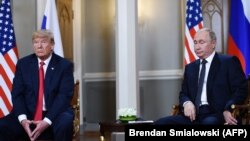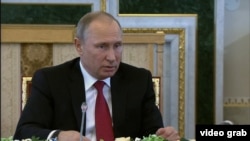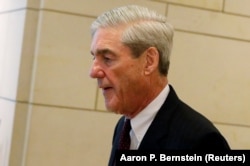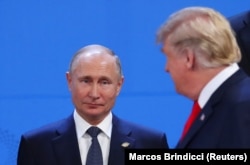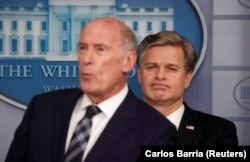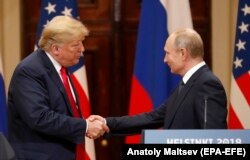On Tuesday, December 11, 2018, a senior official at the Russian Federal Security Service’s (FSB) Cyber Threats Response Center (CTRC), Nikolai Murashov, said that Russia was ready to declassify all correspondence with the United States connected to Russia’s meddling in the 2016 presidential election.
“We are ready to make public all correspondence if the U.S. side gives its consent to it,” the Russian state-owned news outlet RT quoted Murashov as telling reporters.
In its December 11 report on Murashov’s comments, Russia’s state-run RIA Novosti wrote: “American intelligence agencies have accused Russia of ‘interfering with elections’ of 2016, as well as links with Donald Trump. This is denied both in the White House and in the Kremlin.”
The RIA Novosti report quoted Russian presidential spokesman Dmitry Peskov as calling the election interference allegations “absolutely unfounded.” It also quoted Russian Foreign Minister Sergei Lavrov as saying there are “no facts confirming election meddling”.
Ria Novosti concluded: “So far, no one has cited any evidence.”
First: The Russian claim that U.S. intelligence agencies have accused Russia of having links with Trump is false.
In January 2017, the U.S. Intelligence Community issued a declassified assessment of “Russian activities and intentions” in the 2016 U.S. presidential campaign. The assessment, drafted and coordinated among three U.S. agencies – the Central Intelligence Agency (CIA), the Federal Bureau of Investigation (FBI) and the National Security Agency (NSA) -- concluded that Russian President Vladimir Putin ordered an influence campaign in 2016 aimed at the U.S. presidential election with the goals of undermining public faith in the democratic process and harming Hillary Clinton’s “electability and potential presidency.”
It also concluded that Putin and his government “developed a clear preference for President-elect Trump.” All three agencies had “high confidence” in these judgements.
In addition, the three U.S. agencies concluded that Putin and the Russian government “aspired to help President-elect Trump’s election chances when possible by discrediting Secretary Clinton and publicly contrasting her unfavorably to him.” The CIA and the FBI expressed “high confidence” in this judgement, while the NSA expressed “moderate confidence.”
In May 2017, the U.S. Department of Justice appointed former FBI Director Robert Mueller as special counsel to investigate “any links and/or coordination between the Russian government and individuals associated with the campaign of President Donald Trump, and any matters that arose or may arise directly from the investigation.”
Various U.S. congressional committees have also been investigating these and other matters related to Russian interference in the 2016 elections. In March 2018, the House Intelligence Committee issued a report stating that Russia “began engaging in a covert influence campaign aimed at the U.S. Presidential election…at the direction of Vladimir Putin.” The report stated there as “no evidence that the Trump campaign colluded” with Russia. No Democrats joined Republicans in the language, Democrats issuing their own report citing “numerous meetings and contacts between Trump officials…and representatives of the Russian government…” Lawmakers in the Senate and the House have said their investigations will continue.
Next, the Russian claim that the White House has refuted Russia’s election meddling allegations is false, though mixed messages from Trump have led to confusion concerning official policy.
During a September 2016 presidential debate with Hillary Clinton, then-candidate Trump said: “I don’t think anybody knows if it was Russia who broke into the DNC [Democratic National Committee].”
He added: “It could be Russia, but it could also be China. It could also be lots of other people. It also could be somebody sitting on their bed that weighs 400 pounds, okay?”
In April 2017, Trump returned to that framing of events, telling John Dickerson on CBS’s Face the Nation television program: “It’s very hard to say who did the hacking. With that being said, I’ll go along with Russia. It could have been China. It could have been a lot of different groups.”
In February 2018, Trump tweeted he had never denied Russia meddled in the 2016 election, saying rather it could be another country or group, adding: “The Russian ‘hoax’ was that the Trump campaign colluded with Russia - it never did!”
Speaking jointly with Putin in Helsinki, Finland on July 16, 2018, Trump said that U.S. Director of National Intelligence Dan Coats and “some others” had come to him and expressed the view that Russia had hacked the Democratic National Committee’s email server.
“I have President Putin; he just said it’s not Russia,” Trump said. “I will say this: I don’t see any reason why it would be, but I really do want to see the server.”
The next day, Trump said he had meant to say he didn’t see any reason why it “wouldn’t” be Russia.
“I have on numerous occasions noted our intelligence findings that Russia attempted to interfere in our elections,” Trump said.
On July 17, 2018, the White House issued a statement headlined “President Donald J. Trump is Protecting Our Elections and Standing Up to Russia’s Malign Activities.”
“The Trump Administration has maintained the closure of 2 Russian compounds and the expulsion of 35 diplomats in response to Russian interference in the 2016 election,” the statement read.
Those measures were initiated by outgoing President Barack Obama in December 2016.
The following week, Trump further muddied the waters by tweeting:
“So President Obama knew about Russia before the Election. Why didn’t he do something about it? Why didn’t he tell our campaign? Because it is all a big hoax, that’s why, and he thought Crooked Hillary was going to win!!!”
White House press secretary Sarah Sanders subsequently clarified that Trump was talking about “the collusion component.”
“Once again, the President has faith in the intelligence that suggest and maintain that Russia was involved in the elections,” Sanders said.
The following day, Trump tweeted he was “very concerned that Russia will be fighting very hard to have an impact on the upcoming [midterm] election.” Saying no president had been tougher on Russia than him, Trump added that Russia “will be pushing very hard for the Democrats. They definitely don’t want Trump!”
On August 2, Trump’s national security team, including DNI Dan Coats, national security advisor John Bolton, FBI Director Christopher Wray, Homeland Security Secretary Kirstjen Nielsen and National Security Agency Director Paul Nakasone, held a press briefing in which they discussed “pervasive” Russian efforts to interfere in U.S. elections.
On September 12, Trump signed an executive order to help identify and punish any foreign power behind election meddling efforts.
So while Trump’s public comments have clearly lead to some confusion over the White House’s position on Russian interference in the 2016 election, the administration has not denied the fact that such meddling took place.
Therefore, Polygraph finds RIA Novosti’s statement to be false.




